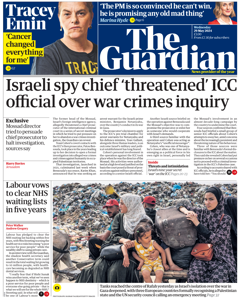
Spying, hacking and intimidation: Israel’s nine-year ‘war’ on the ICC exposed
The Guardian
The remarkable story was a truly global scoop, and the result of months of reporting by Harry Davies, an investigations correspondent. It was an example of the very best of national security investigative reporting: richly told, it unearthed hard–to–reach facts in a global scoop that was widely followed-up, not least in Israel, where Cohen is a well-known political figure viewed as a potential future prime minister.
The article formed part of a wider journalistic collaboration between the Guardian, the Israeli-Palestinian publication +972 Magazine and the Hebrew-language outlet Local Call. That resulted in a second, 4,500 article article, published the same day, revealing the broader story: showing that the Mossad was not alone, but among several Israeli intelligence agencies which had run a covert “war” against the ICC for more than a decade. They included Israel’s domestic spy agency, the Shin Bet, the military’s intelligence directorate, Aman, and its cyber-intelligence division, Unit 8200. Together they were required to surveil, hack, pressure and smear senior ICC staff in an effort to derail the court’s investigations, which threatened to embroil senior Israeli military and political leaders.
The stories revealed that Israeli intelligence had captured the communications of numerous ICC officials, including those of the current chief prosecutor, Karim Khan. Israel’s prime minister, Benjamin Netanyahu, had taken a close interest in the intelligence operations and was described as “obsessed” with the surveillance intercepts.
An investigation of this kind is both extremely complex and challenging. It required the team to develop national security, intelligence, military and criminal justice sources across multiple jurisdictions. There was a high-bar for publication, with a requirement to satisfy senior editors that the stories were impeccably sourced.
The investigation was extremely timely, published a week after Khan announced he was seeking arrest warrants for Netanyahu, and his defence minister, Yoav Gallant, for war crimes and crimes against humanity. It also had a real impact. The Dutch foreign ministry summoned the Israeli ambassador to explain the covert operations on its soil, at the Hague. And in the aftermath of the revelations, a group of 93 countries – close to half the countries in the United Nations – issued a joint statement asserting that the ICC must be allowed to carry out its work “without intimidation”. Prosecutors in the Netherlands are considering whether to open a criminal case against senior Israeli intelligence officials for allegedly interfering in the work of the court.